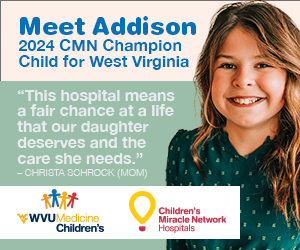Morgantown welcomes a Ugandan refugee.
When Hydary Bossa sees that a resident of Mapleshire Nursing and Rehabilitation Center could use some cheer, he goes a little further than some nursing assistants would. He might sing a song. He might even do a little dance. It’s in this graceful young man’s nature to take care of the people around him.
One has to wonder where he finds the cheer to give. A year ago, Bossa was in Nairobi, Kenya, seeking asylum: a gay Ugandan driven from his home country in March 2014 by Uganda’s Anti-Homosexuality Act. The legislation required citizens to turn friends and family members in to the government and carried a penalty of life imprisonment.
Bossa’s problems started right after he graduated from high school in 2011. That’s when his father learned he was gay and kicked him out of the house. He lived in his mother’s shop for a while, but homophobic sentiment was heating up. “The relatives of my dad started attacking my mom, appearing at the shop, assaulting her, abusing her,” Bossa recalls. “It was too much for her to handle.” She sent him away in July 2012 for her own safety. He crashed for a while with this friend and that friend.
Meanwhile, he’d secretly gotten married. His husband, a student at Makerere University still living with his family, told his parents Bossa was a classmate who had fallen on hard times so they would allow him to live with them. But “you can’t hide the truth forever,” Bossa says from hard experience. As anti-gay political rhetoric continued to escalate, he and his husband rented an apartment. They were becoming known and soon found themselves arrested three times. “We had to bribe the police.” A friend advised Bossa to flee the country and, soon after the anti-gay legislation was signed in February 2014, he crossed the border.
Kenya turned out to be a fire little better than the frying pan. Somalians in the refugee camps there ostracized the new gay Ugandan asylum seekers, and the office of the United Nations High Commissioner for Refugees (UNHCR) in Kenya wasn’t even aware yet that hundreds of Ugandans were fleeing their home.
Bossa, only 20 but resourceful and a good communicator, quickly came to be relied upon by the UNHCR as one of a small number of semi-official liaisons between the UN and groups of gay asylum seekers. “After all the challenges and the difficulties I passed in Uganda, that made me brave to stand up and advocate for LGBTQ members and for the refugees,” he says.
He took his leadership role seriously. He used a group he’d started, Youth Uplift Uganda, to raise awareness and funds. He rented a house as a safe place for some of the more vulnerable members of his group. “In Kenya, they don’t allow same sex, so you can’t even find a job—you have to be in the house, or the police keep disturbing you.” He bought chicks so the residents could keep the hens and sell eggs as a small source of income. He helped those who got arrested get out of jail. And he worked the UNHCR process by which each asylum seeker in his group would earn official refugee status and be resettled in a host country.
In the course of all that, Bossa met Morgantown resident Dave Saville. Saville visits Kenya every year for pleasure and to do humanitarian work. They became acquainted when Bossa helped a friend of Saville’s.
It was a frustrating and sometimes dangerous period, Bossa remembers. But the resettled refugees weren’t all having an easy time either, he knew. “Standards of living, integration—everyone was complaining,” he recalls. Many were isolated in their new communities in Pennsylvania, California, and elsewhere, without support systems. So when Bossa’s own asylum process was nearing completion in the fall of 2016, he asked Saville to serve as his “tie” to West Virginia. Then Catholic Charities of West Virginia (CCWV) became his needed organizational sponsor. CCWV resettles a couple dozen refugees in West Virginia each year on average, according to Case Manager Elizabeth Ramsey.
The U.S. Department of State cleared Bossa for resettlement in West Virginia in December 2016. He felt relieved but also sad to leave people he loves behind without an advocate like himself to stand up for them. His trip was heavily orchestrated—a refugee surrenders his native citizenship and does not have a passport, so resettlement is a series of hand-offs. “The International Organization for Migration (IOM) had made my travel arrangements, and they took me to Kenyatta International Airport in Nairobi,” he explains. “Newark was my port of entry. An IOM worker there escorted me through.” He was flown to Charleston the next day. Ramsey met him at the airport and drove him to Morgantown. Since Bossa’s arrangements had come up suddenly and Saville was still in Kenya, she delivered him to a group Bossa has come to call “the mums”—Saville’s friend Susan Eason and a welcoming group of Morgantown supporters.
The mums helped Bossa navigate the overwhelm of being a refugee in the U.S.: applying for a social security number, finding an apartment, getting a job, understanding transportation, making a longer-term plan. All along, they’ve included him in social gatherings and made themselves available to brainstorm and deal with emergencies. “This is a whole new culture,” says Eason, his biggest supporter. “It takes a lot of time and care if you really want a refugee to be successful and not flounder and eventually be on the streets.”
Today, Bossa and a fellow refugee who has joined him from California rent an apartment in Morgantown. Bossa stocked shelves part-time at Kroger on Patteson Drive while he studied to become a certified nursing assistant (CNA). In June he accepted a full-time position at Mapleshire. “I bring the residents food,” he says. “I feed those who can’t feed themselves. Sometimes I bathe them. I like talking to them and sometimes I sing or dance because they are my residents—I have to make sure they are happy.”
He devotes his free time to helping the Ugandan asylum seekers remotely and to LGBTQ activism. He still raises and sends money to Nairobi for rent and chicken feed. “And I keep on doing my advocacy work with cases before the UNHCR.” Part of what motivates him is the hope of getting his fiance—the turmoil of the past several years brought an end to his previous marriage—and his best friend out of Kenya and into Morgantown. In September, they had finally received refugee status, but Ramsey said next steps will depend on the fate of the U.S.’s 120-day refugee travel ban, which the U.S. Supreme Court may affirm or may allow to expire in late October.
Uganda’s anti-gay legislation was overturned on a technicality in August 2014, although anti-gay sentiment continues to run high. If the act is not revived, the flow of refugees may end. Bossa can apply for a U.S. green card, or permanent residency, when he’s been here a year, Ramsey says, and after five years he can apply for U.S. citizenship.
Meanwhile, he remains a refugee: a man without a passport. But for the first time in a long time, he has a home. Asked whether he has felt welcome in Morgantown, he does not hesitate. “So welcome,” he says with a big smile. “I’ve never had any difficulty, I’ve never been in need of anything. If I contact Mum Susan, even if she’s far out from me, she reaches out to someone. So I’ve had everything good.” youthupliftuganda.org
photographed by CARLA WITT FORD






Leave a Reply